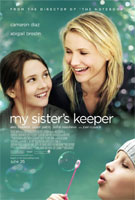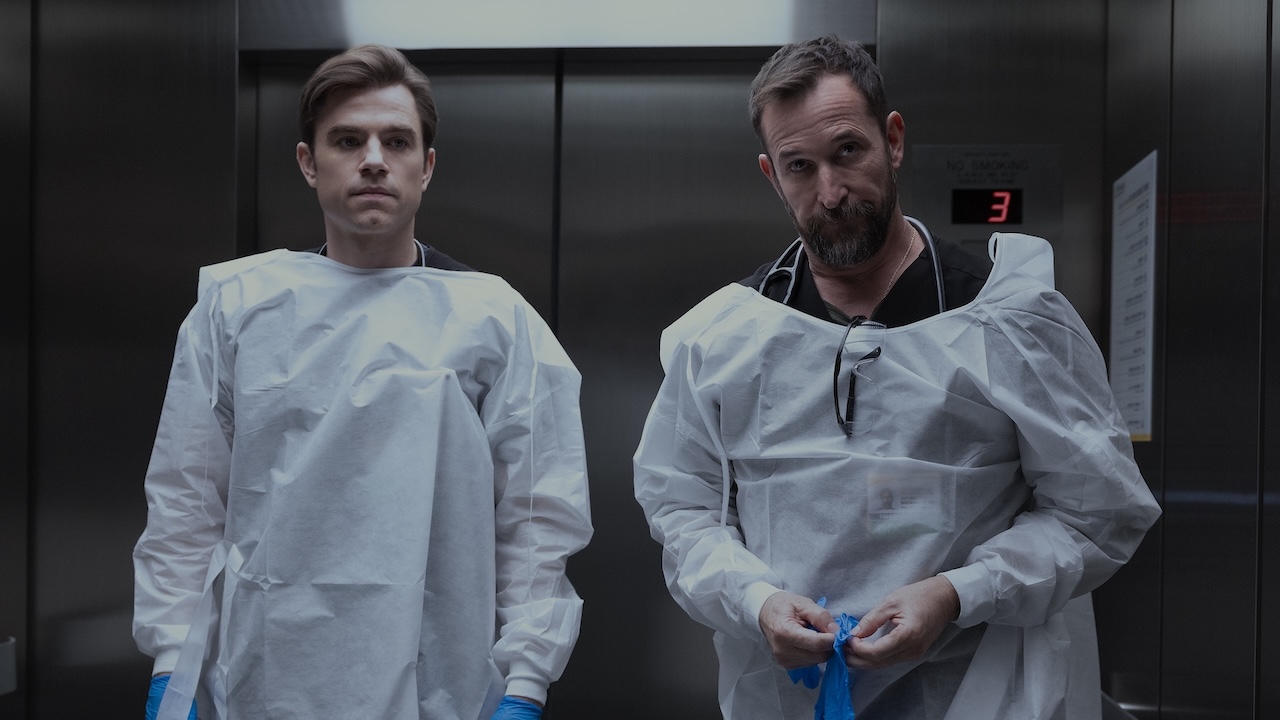The world is depressing enough already, what with the Iranian election protests and the dismal weather in New York and the very existence of Transformers: Revenge of the Fallen. Do we really need a movie like My Sister's Keeper, which doesn't tell a sad story so much as wallow in it? Do we really need to see a bald little girl vomit blood, see a happy couple disintegrate due to their child's sickness, see Alec Baldwin have a seizure?
It's a sad fact that innocent, great kids can get cancer, and few movies have really dug into this tragic corner of life the way My Sister's Keeper does. But rather than search for any real emotional truths or demand dynamic performances from its talented cast, the movie just hijacks your tear ducts from the word "go." Odds are you'll cry during this movie, but you might be too confused by the time-jumping narrative, too busy wondering how many pop song montages they can cram into the running time, and too ashamed of your giggles when the melancholy tips the scales toward schmaltz.
Director Nick Cassavetes, who helped audiences guiltily swoon over The Notebook, pulls out all the cinematic stops to no great effect; if he's not using hazy filters to evoke innocence of childhood or letting the camera linger on an overly production-designed scrapbook, he's busting out floaty pop songs that substitute for actual dialogue. In Jodi Picoult's original novel each of the central characters took turns narrating, and at the beginning of the film the characters are introduced with a title card and a turn at narrating the story. That device, which might have helped ground the audience in this mess of squabbling family members, gets abandoned about halfway through; I gave up my willingness to go along with this nonsense long before then.
For a movie that sounds so plot heavy in concept-- a young girl sues her parents for legal emancipation-- most of My Sister's Keeper just keeping up with its conflicted characters. Kate (Sofia Vassilieva) has had cancer since she was four, and her mom Sara (Cameron Diaz) has dedicated her entire life since then to saving Kate's life. On a shady recommendation from a doctor, Sara and her husband Brian (Jason Patric) conceived a third child for the sole purpose of providing bone marrow, blood and even organs for Kate's failing system. That child is Anna (Abigail Breslin), who at 11 years old and facing a kidney donation to her sister, decides to sue her parents for the right not to do it.
With an 11-year-old's logic she hires flashy lawyer Campbell Alexander (Alec Baldwin), who has a service border collie for seemingly the only purpose of offering a cute dog for a bored audience. Through a series of nested flashbacks taking place throughout Anna's life, her real reasons for suing her family are revealed long before the "shocking" courtroom confession. A single glimpse at the beatific Kate, ensconced in her hospital bed and constructing that fancy scrapbook, tells far more than Cassavetes seems to realize.
Wailing and screaming and fighting with everyone else onscreen, Cameron Diaz is giving a powerhouse performance her character doesn't warrant; Sara's only motivation in the entire film is "save my daughter," and despite Diaz's best efforts, there's no range of emotion to the character. Vassilieva fares a bit better in her character's flashbacks, as we see her fall in love with another cancer patient (Thomas Dekker) and try her hand at teenage rebellion. Breslin, on the other hand, is a complete cipher, mostly because her character's motivations are unexplained through the entire film. She and Vassilieva has a nice sisterly vibe, but the chopped up narrative keeps that relationship-- or any, really-- from developing organically.
It feels unbelievably cynical to start giggling during a movie about a girl with cancer, but My Sister's Keeper is just as cynical, calibrating its every move to get us to cry so hard we recommend the movie to our friends. Just as Transformers 2 throws in dog-humping and pot brownies to keep their target audience entertained, My Sister's Keeper indulges in girl talk and sappy montages. Same focus-groupped hackery, different audience.
Your Daily Blend of Entertainment News
Staff Writer at CinemaBlend


